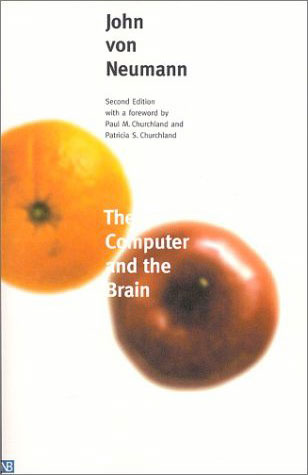Computing Heroes
I was chatting to a mate of mine about a remarkable book that I found the other day:

One of the greatest intellectuals of our century writes about computing systems and fundamental aspects of the brain. What’s there not to like here? I’m only halfway through the book, and it’s already got so much worthy material in it that I will recommend it to any other computing folks. It’s worth it for the Foreword alone.
Alas, von Neumann passed on a while ago. Right after our discussion, I find out that John Backus passed away last Saturday. Phil Windley comments that “Computer Science has always been a discipline where the founders were still around. That’s changing.”
Arguably computing’s most famous face-person right now is Bill Gates. I don’t see Gates being famous as bad: after all, the guy is a multi-billionaire, which naturally gives him a little bit of a reputation, and his philanthropic acts are to be admired even if one despises his business tactics. However, what does the greater public know about our real heroes? Alan Turing? John von Neumann? Grace Hopper? Alan Kay? John Backus? Donald Knuth? Edsgar Dijkstra? Doug Engelbart?
I remember when John Shepherd taught me CS2041 at university, he spent 5 minutes at the start of each lecture talking about “famous geeks” and what they did for our industry. We need to educate ourselves as an industry and learn and respect what these folks did; go back to our roots; respect our elders. I’d wager that a lot more mathematicians know about Bertrand Russell and Leonhard Euler than self-described programmers and computing geeks know about Alan Turing and Edsgar Dijkstra.
If you’re a programmer (or even if you’re not), go to Wikipedia’s list of Turing Award winners sometime and just start reading about people you don’t know, starting with the man who the Turing award’s named after. (I’m ashamed to say that I only recognise a mere 22 out of 51 names of the Turing Award winners, and I’m scared to think that I’m probably doing a lot better than a lot of other folks.)
I understand that people such as Knuth and Dijkstra made specialised contributions to our field, and that the greater public won’t particularly care for them (in the same way that a lot of the general public won’t know about Bertrand Russell or even Euler, but they’re known by pretty much every single mathematician). However, there are lots of computing legends who we can talk about at dinner with all our non-geek friends and family. Go get Doug Engelbart’s Mother of All Demos or Ivan Sutherland’s Sketchpad demo and show it to your friends. Tell your family about the role that Turing played in World War II, and the amusing story of Grace Hopper finding an actual bug inside her computer.
As Dijkstra said, “in their capacity as a tool, computers will be but a ripple on the surface of our culture. In their capacity as intellectual challenge, they are without precedent in the cultural history of mankind.” Computing is one of the most important things to emerge from this entire century. I hope that in twenty years’ time, at least Alan Turing will be a household name alongside Bill Gates. Let’s do our part to contribute to that.
